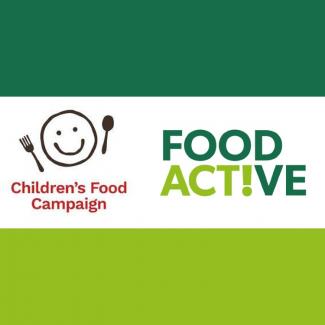Junk food industry is hijacking sport and children’s health, say health organisations and parents
The power of UK sport to influence healthier lifestyles is being undermined by a constant barrage of unhealthy food and drink sponsorship deals and advertising, a new report by the Children’s Food Campaign and Food Active has found.
Published Wednesday 24 November, Kicking Out Junk Food documents how 2021’s ‘Summer of Sport’ was used by the food and drink industry to deluge families with marketing, advertising and sports personality-led promotions for pizzas, burgers, chocolate, crisps and fizzy drinks.
Researchers also invited parents to share their views and experiences of sports sponsorship by less healthy food and drink brands:
• 90% said the marketing of junk food through sport made it harder for them to feed their children a healthier diet food.
• 86% said Government should create new laws to stop partnerships between junk food brands and sport.
• 9 in 10 also agreed that grassroots sports and physical activities shouldn’t have to rely on food and drink brands for funding
Key sporting events monitored by the research included UEFA’s EURO 2020 tournament, the English Cricket Board’s new The Hundred tournament, the Tokyo Olympic and Paralympic Games, and a host of football leagues and cup competitions. Brands named in the report who established deals with sports bodies in order to be associated with sports clubs, tournaments and stars included Coca Cola, McDonald’s, Just Eat, Deliveroo, Cadbury/Mondelez, KP Snacks, Papa John’s Pizza and Carabao energy drinks, amongst others.
However, some sports stars are starting to agree with health campaigners and parents on the health of these partnerships. In one of the most memorable points of the sporting summer, global soccer star Cristiano Ronaldo removed two Coke bottles during a UEFA Euro 2020 press conference, urging fans to drink water instead. In October 2021, Australian cricketer David Warner attempted to repeat this feat, only to be told to replace the bottles on the desk.
In the research with 346 parents across the UK, many voiced serious concerns about the way sports bodies and celebrities associate themselves with junk food brands, rather than acting as role models for healthy eating for children.
The report’s authors are calling on Government and the sports industry to take action to kick junk food advertising out of sport including:
• Government to include sports sponsorship in all future healthier advertising and marketing regulations for food and drink.
• Sports associations to refuse all further sponsorship deals that include marketing less healthy food or drink brands
• High profile athletes and sports personalities to use their influence to support healthy food programmes and refuse to work with less healthy brands
Case studies collected over the summer found a plethora of marketing techniques utilised by less healthy food and drinks brands, including street-level advertising; shirt and sleeve sponsorship; social media and app-based promotions; the use of sports personalities, and discounted matchday food bundles at retail outlets and through online food delivery platforms.
When parents were asked what effect marketing of less healthy food and drink through sport has on children, the top three impacts were cited as: ‘pestering their parents for less healthy food and drink’ (81%), followed by ‘preferring the brands linked with their favourite team or player’ (78%) and ‘thinking it is okay to eat less healthy food and drink’ (77%).
This is particularly concerning given the recent National Child Measurement Programme results indicating a significant increase in levels of obesity in primary school aged children over the Covid-19 lockdown. 1
The Kicking Out Junk Food report is released as the Government is set to implement new legislation on healthier food marketing via the Health and Social Care Bill currently being debated in Parliament. As well as a 9pm watershed and total online restriction for a selected range of less healthy food and drink products, it is also introducing legislation to limit retail multibuy price and in-store display promotions. However, brand level advertising and many other tactics used in sports sponsorship marketing falls out of scope of these plans.




